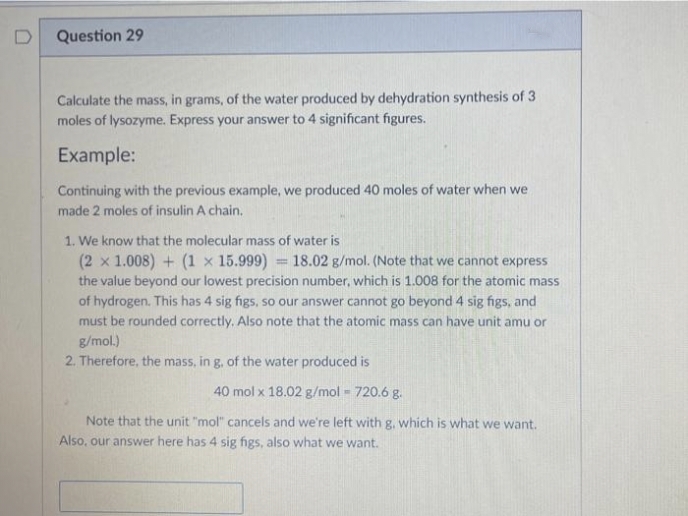Question 29 Calculate the mass, in grams, of the water produced by dehydration synthesis of 3 moles of lysozyme. Express your answer to 4 significant figures. Example: Continuing with the previous example, we produced 40 moles of water when we made 2 moles of insulin A chain. 1. We know that the molecular mass of water is (2 x 1.008) + (1 x 15.999)- 18.02 g/mol. (Note that we cannot express the value beyond our lowest precision number, which is 1.008 for the atomic mass of hydrogen. This has 4 sig figs, so our answer cannot go beyond 4 sig figs, and must be rounded correctly. Also note that the atomic mass can have unit amu or g/mol.) 2. Therefore, the mass, in g, of the water produced is 40 mol x 18.02 g/mol = 720.6 g. Note that the unit "mol" cancels and we're left with g, which is what we want. Also, our answer here has 4 sig figs, also what we want.
Question 29 Calculate the mass, in grams, of the water produced by dehydration synthesis of 3 moles of lysozyme. Express your answer to 4 significant figures. Example: Continuing with the previous example, we produced 40 moles of water when we made 2 moles of insulin A chain. 1. We know that the molecular mass of water is (2 x 1.008) + (1 x 15.999)- 18.02 g/mol. (Note that we cannot express the value beyond our lowest precision number, which is 1.008 for the atomic mass of hydrogen. This has 4 sig figs, so our answer cannot go beyond 4 sig figs, and must be rounded correctly. Also note that the atomic mass can have unit amu or g/mol.) 2. Therefore, the mass, in g, of the water produced is 40 mol x 18.02 g/mol = 720.6 g. Note that the unit "mol" cancels and we're left with g, which is what we want. Also, our answer here has 4 sig figs, also what we want.
Chemistry & Chemical Reactivity
10th Edition
ISBN:9781337399074
Author:John C. Kotz, Paul M. Treichel, John Townsend, David Treichel
Publisher:John C. Kotz, Paul M. Treichel, John Townsend, David Treichel
Chapter20: Environmental Chemistry-earth's Environment, Energy, And Sustainability
Section: Chapter Questions
Problem 40PS
Related questions
Question

Transcribed Image Text:D
Question 29
Calculate the mass, in grams, of the water produced by dehydration synthesis of 3
moles of lysozyme. Express your answer to 4 significant figures.
Example:
Continuing with the previous example, we produced 40 moles of water when we
made 2 moles of insulin A chain.
1. We know that the molecular mass of water is
(2 x 1.008) + (1 x 15.999) = 18.02 g/mol. (Note that we cannot express
the value beyond our lowest precision number, which is 1.008 for the atomic mass
of hydrogen. This has 4 sig figs, so our answer cannot go beyond 4 sig figs, and
must be rounded correctly. Also note that the atomic mass can have unit amu or
g/mol.)
2. Therefore, the mass, in g, of the water produced is
40 mol x 18.02 g/mol = 720.6 g.
Note that the unit "mol" cancels and we're left with g, which is what we want.
Also, our answer here has 4 sig figs, also what we want.
Expert Solution
This question has been solved!
Explore an expertly crafted, step-by-step solution for a thorough understanding of key concepts.
Step by step
Solved in 3 steps

Knowledge Booster
Learn more about
Need a deep-dive on the concept behind this application? Look no further. Learn more about this topic, chemistry and related others by exploring similar questions and additional content below.Recommended textbooks for you

Chemistry & Chemical Reactivity
Chemistry
ISBN:
9781337399074
Author:
John C. Kotz, Paul M. Treichel, John Townsend, David Treichel
Publisher:
Cengage Learning

Chemistry & Chemical Reactivity
Chemistry
ISBN:
9781133949640
Author:
John C. Kotz, Paul M. Treichel, John Townsend, David Treichel
Publisher:
Cengage Learning

Chemistry by OpenStax (2015-05-04)
Chemistry
ISBN:
9781938168390
Author:
Klaus Theopold, Richard H Langley, Paul Flowers, William R. Robinson, Mark Blaser
Publisher:
OpenStax

Chemistry & Chemical Reactivity
Chemistry
ISBN:
9781337399074
Author:
John C. Kotz, Paul M. Treichel, John Townsend, David Treichel
Publisher:
Cengage Learning

Chemistry & Chemical Reactivity
Chemistry
ISBN:
9781133949640
Author:
John C. Kotz, Paul M. Treichel, John Townsend, David Treichel
Publisher:
Cengage Learning

Chemistry by OpenStax (2015-05-04)
Chemistry
ISBN:
9781938168390
Author:
Klaus Theopold, Richard H Langley, Paul Flowers, William R. Robinson, Mark Blaser
Publisher:
OpenStax

General Chemistry - Standalone book (MindTap Cour…
Chemistry
ISBN:
9781305580343
Author:
Steven D. Gammon, Ebbing, Darrell Ebbing, Steven D., Darrell; Gammon, Darrell Ebbing; Steven D. Gammon, Darrell D.; Gammon, Ebbing; Steven D. Gammon; Darrell
Publisher:
Cengage Learning